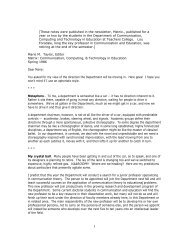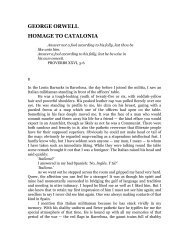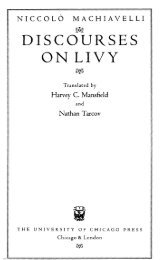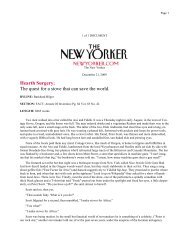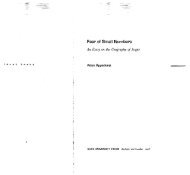THE REPUBLIC OF PLATO - Studyplace
THE REPUBLIC OF PLATO - Studyplace
THE REPUBLIC OF PLATO - Studyplace
Create successful ePaper yourself
Turn your PDF publications into a flip-book with our unique Google optimized e-Paper software.
1NTtlODUCTION<br />
natural right of the strong man. It is conventionally called 'llnjust';<br />
but conventions are made by the multitude of the inferior, who<br />
praise equality, the watchword of democracy, because they cannot<br />
get the lion's share for themselves. Callicles appeals to the example<br />
of the lower animals and to the unmitigated selfishness which at<br />
all times governs international relations. In private life he believes<br />
himself to be a whole-hearted hedonist.<br />
The discussion which follows is marked by a bitterness of tone<br />
rarely found elsewhere in the dialogues. The explanation may be<br />
sought in the conflict which had distracted Plato's own mind. The<br />
voice of his political friends is to be heard in the speech where<br />
Callicles contrasts the two lives of public activity and philosophic<br />
study. After asserting the strong man's right to burst the bonds of<br />
convention, he continues:<br />
'That, then, is the troth, as you will find out if you will have done<br />
with philosophy and tum to things of more importance. Philosophy,<br />
you know, Socrates, is well enough if it is taken up with moderation<br />
at the proper age; but to spend too long a time over it spoils a man.<br />
for life. 1 He may have quite good natural gifts, but if he goes on with<br />
such study too late in life, it must end in his missing all that experience<br />
which a man of good position ought to possess, if he is to make<br />
his mark. Such people know nothing about the institutions of their<br />
country, nothing of the language of ordinary social relations, public or<br />
private, nothing of the pleasures and ambitions of common humanity;<br />
in a word, they prove to be completely ignorant of the ways of the<br />
world. So, as soon as they make an appearance in any public transaction<br />
or business of their own, they become ridiculous, just as, I dare<br />
say, men of affairs cut a ludicrous figure in these arguments of yours.<br />
The fact is, as Euripides says, that<br />
"a man shows best<br />
Where he outshines himself; to climb that height<br />
Hell spend in labour more than half his days."<br />
He fights shy of the points where he shows at a disadvantage and gives<br />
them a bad name, while he cries up his strong points out of loyalty to<br />
himself, hoping in that way to be singing his own praises.<br />
1 Cf. Adeimantus' objection at Rt:f1. 487 B (p. 194).



